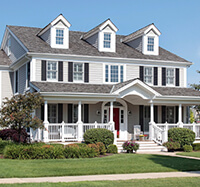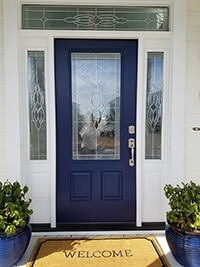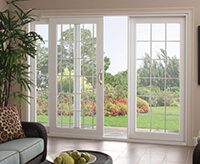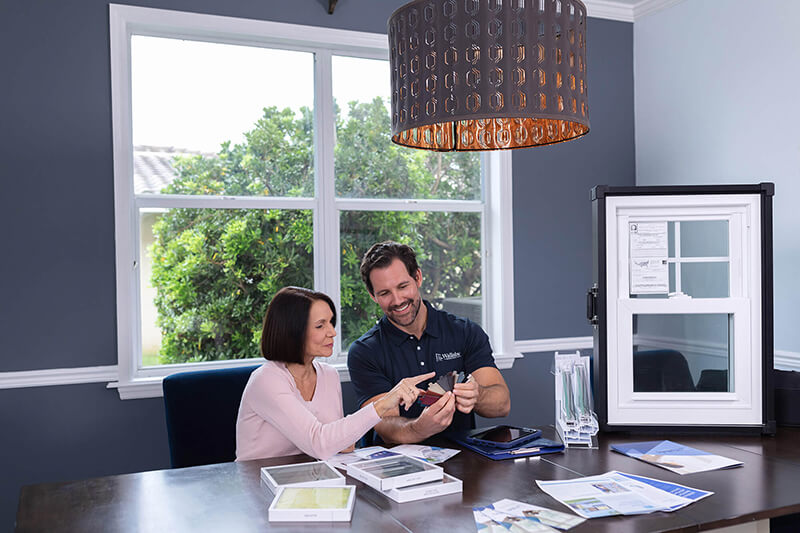
ENERGY STAR® Replacement Windows & Doors in Chattanooga
What does it mean to be an ENERGY STAR® Windows & Doors provider?
The ENERGY STAR® program is a voluntary initiative in the United States that promotes energy efficiency. It is managed by the U.S. Environmental Protection Agency (EPA) and the U.S. Department of Energy (DOE). ENERGY STAR certification is given to products and services that meet strict energy efficiency guidelines set by these agencies.
Being an ENERGY STAR Windows & Doors provider means that a company or supplier offers windows and doors that meet or exceed the ENERGY STAR criteria for energy efficiency. In the context of windows and doors, this typically involves products that are designed to be more energy-efficient, helping to reduce energy consumption in buildings and homes.
ENERGY STAR-certified windows and doors are designed to:
-
Reduce Energy Costs: They are engineered to minimize heat loss during the winter and heat gain during the summer, contributing to lower heating and cooling costs.
-
Enhance Comfort: Efficient windows and doors can help maintain consistent temperatures in your home, making it more comfortable year-round.
-
Reduce Greenhouse Gas Emissions: By using less energy for heating and cooling, ENERGY STAR products help decrease greenhouse gas emissions, contributing to environmental sustainability.
-
Promote Environmental Stewardship: ENERGY STAR-certified products are often manufactured using environmentally friendly materials and processes.
When choosing windows and doors with the ENERGY STAR label, consumers can have confidence that the products have been independently certified to meet or exceed stringent energy efficiency standards. This helps consumers make informed decisions about the environmental impact and energy performance of the products they are purchasing.
How are Windows and Patio Doors Identified as ENERGY STAR 2023 Most Efficient Products
As of my last knowledge update in January 2023, the ENERGY STAR Most Efficient designation is an annual recognition that goes to a select group of products within various ENERGY STAR categories, including windows and doors. However, specific details about the 2023 Most Efficient Products may have been updated since then. For the most accurate and up-to-date information, you should check the official ENERGY STAR website or contact the ENERGY STAR program directly.
Typically, the ENERGY STAR Most Efficient designation is awarded to products that meet or exceed the highest efficiency levels within their respective product categories. The criteria for the Most Efficient designation may include considerations such as:
-
Performance Ratings: Products are evaluated based on their energy performance ratings, which are determined through standardized testing procedures.
-
U-Factor and Solar Heat Gain Coefficient (SHGC): These are metrics used to measure the insulating and solar heat gain properties of windows and doors. Lower U-factor values indicate better insulation, while lower SHGC values indicate better protection against unwanted heat gain.
-
Air Leakage: The amount of air that can pass through gaps in the window or door assembly is measured. Lower air leakage values indicate better energy efficiency.
-
Visible Transmittance: This measures how much visible light passes through the window or door. Higher values indicate more natural light.
-
Frame Materials and Design: The materials and design of the window or door frame can impact its overall energy efficiency. ENERGY STAR considers factors such as frame material, frame design, and the use of insulating materials.
-
Additional Features: The inclusion of advanced features such as low-emissivity (low-E) coatings, multiple panes of glass, and gas fills between the panes can contribute to higher energy efficiency.
To find products designated as ENERGY STAR Most Efficient in a given year, you can visit the official ENERGY STAR website or look for the Most Efficient label on products and promotional materials from manufacturers. Keep in mind that criteria and designations may evolve, so checking the most recent information is essential for accurate details.
What makes replacement windows Energy Efficient?
Replacement windows can contribute significantly to energy efficiency in a home. Several factors determine the energy efficiency of replacement windows, including:
-
Insulating Materials:
- Frame Materials: High-quality, well-insulated frame materials are crucial for energy efficiency. Common frame materials include vinyl, wood, fiberglass, and aluminum. Each material has different insulating properties, with some being more thermally efficient than others.
-
Multiple Panes of Glass:
- Double or Triple Glazing: Replacement windows with two or three layers of glass (double or triple glazing) provide enhanced insulation compared to single-pane windows. The spaces between the panes may be filled with insulating gases like argon or krypton to further reduce heat transfer.
-
Low-E Coatings:
- Low-E (Low Emissivity) Coatings: Low-E coatings are thin, virtually invisible layers applied to the glass surface. They help minimize heat transfer and UV rays while allowing visible light to pass through. This feature is particularly beneficial for maintaining comfortable indoor temperatures.
-
Spacer Systems:
- Warm-Edge Spacer Systems: The spacer is the material that separates the individual panes of glass in an insulating glass unit. Warm-edge spacers reduce heat conduction and condensation along the window edges, improving overall energy efficiency.
-
Window Seals and Weather Stripping:
- Effective Seals: High-quality seals and weather stripping prevent air leakage around the window frame. This is crucial for maintaining a tight seal, reducing drafts, and improving energy efficiency.
-
U-Factor and Solar Heat Gain Coefficient (SHGC):
- Low U-Factor: The U-factor measures the rate of heat transfer through the window. Lower U-factor values indicate better insulation.
- Appropriate SHGC: The Solar Heat Gain Coefficient (SHGC) measures how much solar heat the window allows to enter the home. Depending on your climate, you may want a higher or lower SHGC.
-
Proper Installation:
- Professional Installation: A proper and precise installation by qualified professionals ensures that the replacement windows are airtight and function optimally. Poor installation can lead to air leaks and reduce overall energy efficiency.
-
Operational Features:
- Energy-Efficient Window Styles: Some window styles, such as casement or awning windows, provide a better seal when closed compared to sliding or double-hung windows. The way a window opens and closes can affect its energy efficiency.
When selecting replacement windows, it's essential to consider your climate, the orientation of your home, and the specific energy efficiency features of the windows. ENERGY STAR certification is a helpful indicator of a window's energy performance, so look for this label when making your selection.
So, now that you’ve read about Wallace Windows’ fantastic selection of replacement windows and doors for Chattanooga homeowners and why it is an excellent choice, don’t wait a minute longer! Pick up the phone and call Wallaby Windows today to get your free in-home quote. Don't let this prime opportunity pass you by - act now and make your home look brand new! Maybe start a renovation project to really spice up the rooms - it doesn't have to be hard and it could even become fun! Get creative with colors, designs or textures to make your discovery of the perfect window that much more enjoyable. Remember, at Wallaby Windows we guarantee results that will leave you feeling satisfied. Have an unforgettable experience only when you choose Wallaby Windows.




